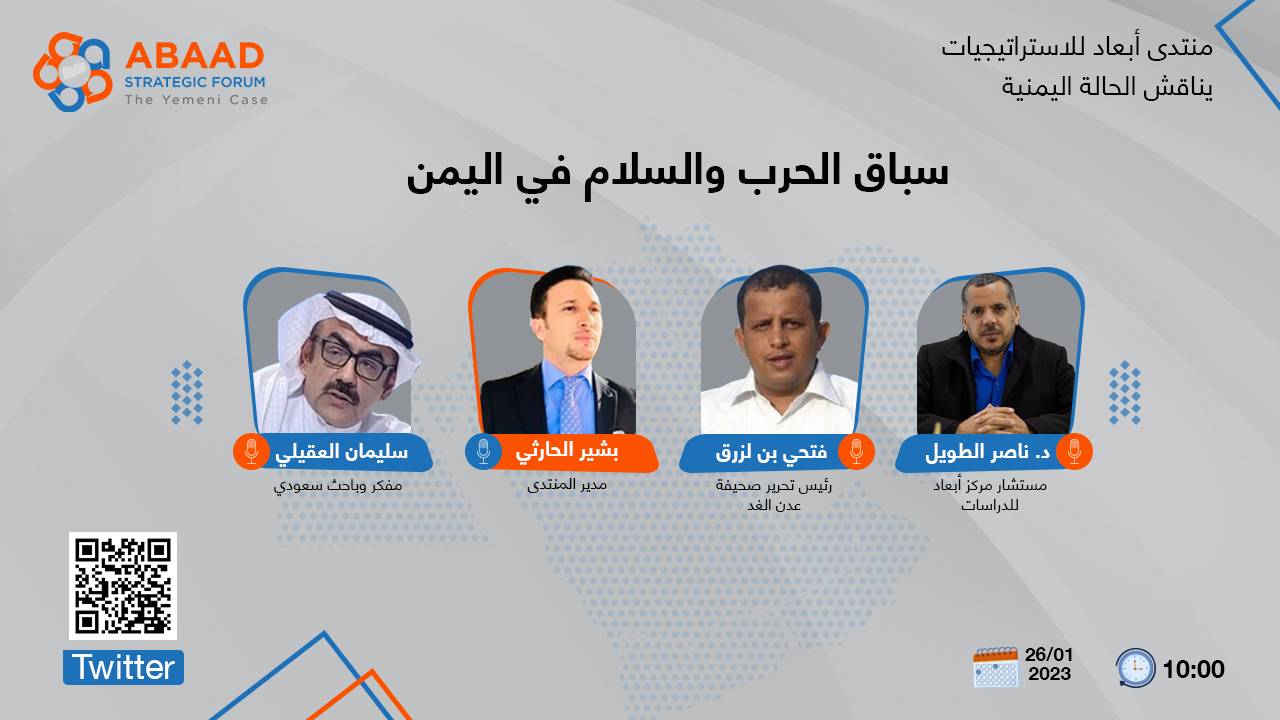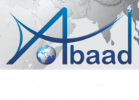Participants in Abaad Strategic Forum: Chances of Comprehensive Peace in Yemen Are Still Distant

عربي
Participants in webinar held by Abaad Strategic Forum unanimously agreed on the difficulty of reaching a comprehensive peace agreement in Yemen at the current phase. They pointed out that the Iranian regional agenda of targeting the Gulf hinders any efforts to reach peace before achieving its goals.
In the Forum Twitter space, which was moderated by journalist Bashir Al-Harithi, nearly a thousand followers listened to a presentation of a position paper by Abbad that provided several potential scenarios of the status of war and peace in Yemen.
Author of the position paper, Dr. Nasser Al-Taweel, pointed out three potential scenarios for the current situation. The first scenario is continuity of the status quo. This would involve renewal of the truce, without proceeding to the next step of holding serious negotiations culminating in a settlement.
The second scenario outlined by the study is imposing an end to the war. This scenario is the opposite of the third one, which projects resumption of hostilities and a return to war.
Saudi researcher and journalist, Suleiman Al-Oqiley, stated that Iran wanted Yemen to be a platform of concern for the Kingdom, adding that some western powers may favor such a situation and seek to manage the conflict in Yemen rather than solve it. He pointed out that peace with the Houthi group is almost impossible since it is an Iranian project. According to Al-Oqiley, a long truce scenario is the most likely, explaining that such a scenario would help "bring together the shattered Yemeni forces.” Yet, he did not rule out the scenario of a return to war.
For his part, former Minister of Industry, Dr. Saaduddin bin Talib, who is a supporter of an independent Hadrami state, stated that the current situation is marked by “fragile truces that do not save Yemen from the spiral of collapse.” He believes that the way out of this spiral lies in finding a new solution based on a new federal state in which all regions are given autonomy.
Former Yemeni ambassador to Lebanon, Dr. Ali Al-Dailami- who refused being designated as close to the Houthis- said that what is going on now is an incomplete and distorted peace process that would lead to more destructive wars in the future. He added, "Apparently, the efforts of the Omani mediation currently focus on the humanitarian aspect more than on mediating a political solution."
Al-Dailami stressed the need for a comprehensive settlement and peace in Yemen, in which all parties are engaged. He warned that a settlement between Saudi Arabia and the Houthis exclusively "will lead to a distorted situation and future conflicts, especially in view of the internationally recognized government concerns regarding such agreements.”
However, former Minister of Transport, Saleh Al-Jabwani, ruled out Saudi Arabia's entry into peace negotiations with the Houthis. He states that "The Houthis seek to secure advantages through an illusion of peace to expand their control to other the the rest of Yemeni governorates. I do not think that Saudi Arabia will enter into peace with Houthi in the strategic term because it contradicts Saudi national security."
Al-Jabwani's views agreed with the point of view of the southern activist, Omar Al-Awlaki, who states, "The Houthis are not pacifists and I don't think there will be a peace project with them in the near future."
Journalist Yassin Al-Tamimi agrees with this point of view, while providing a broader explanation, "Iran is targeting Saudi Arabia and is using Yemen as a base of operations. Iran cannot accept a peace deal with Saudi Arabia before achieving its goal. We are facing an agenda." He adds, "Iran is pursuing a cross-border sectarian agenda."
For his part, Shawky Al-Qadi, MP, pointed out what he called "an external agenda that seeks to persuade Saudi Arabia to coexist with the Houthis". He adds, "The Houthi group is an Iranian project. Therefore, it is a threat to both Yemen and Saudi Arabia.”
This view was confirmed by journalist Ahmed Al-Zurqa, who stated, "The Houthi project is based on war. So, talking about peace with the Houthis is an illusion."
For his part, Jordanian journalist, Waheed Tawalbeh, expressed a different opinion, saying, "There is no longer a race for war. Saudi Arabia and Egypt will resume their relations with Iran, as the UAE did."
However, the Saudi expert, Saad Muhammad Al-Amri, denied the existence of any agreement with the Houthis. He said, "When we held talks with them in Dhahran Al-Janoub,
Saudi Arabia announced the event. The delegation that went to Sana'a discussed the issue of prisoners."
For his part, the Hadhrami activist, Omar bin Hilabi, said that peace is based on certain factors that are not available at present, as the Houthis do not believe in peace, and there are parties within the legitimate government that do not believe in the Republic of Yemen as such and therefore disrupt any dream of peace. He believes that the real ground for peace is to support the state with a force that can impose peace.
Majid bin Omairah expressed his surprise at raising the issue of a Saudi-Houthi agreement, accussing unnamed parties of raising such issues.
As for the Hadhrami activist Salem Al-Nahdi, he believes that there is a Western conspiracy against Saudi Arabia, that is being implemented through Yemen. Activist Majid Al-Harithi from Shabwa reminded participants of a fact they missed stating, "The internal situation and the living and economic tragedies in Yemen have caused the Yemeni people to lose their confidence in all parties,” ruling out the possibility of peace in the case of lack of public confidence in the state.
For his part, journalist Abdussalam Al-Shuraihi criticized dealing with the Houthis with the 2015 mentality, explaining, "The Houthis have gone too far in implementing their project. Therefore, any negotiations based on past considerations are wrong." He added, "Current negotiations may be a round to stop fighting, but they will not be a round for peace."
A technical problem as a result of slow internet connectivity in Aden prevented the main guest in the forum, editor-in-chief of Aden Al-Ghad newspaper, Fathi bin Lazraq, from participation.
________________________
Listen to Abaad Forum space webinar, which lasted for more than five hours, here.






